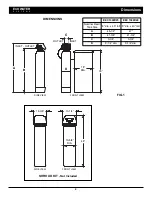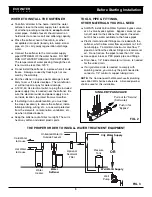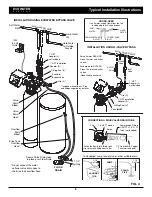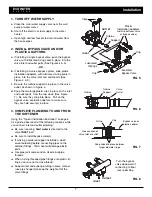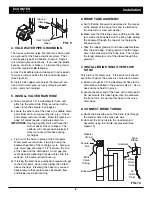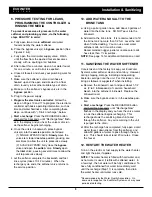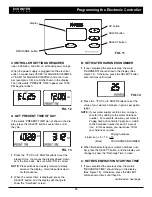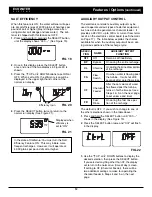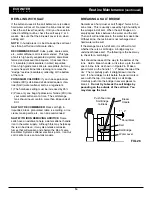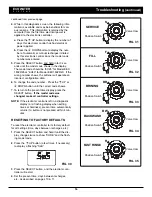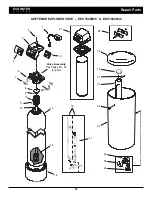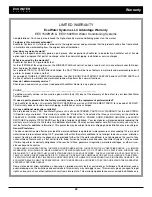
9
ECOWATER
S Y S T E M S
Installation & Sanitizing
9. PRESSURE TESTING FOR LEAKS,
PROGRAMMING THE CONTROLLER &
RINSING THE MEDIA
To prevent excessive air pressure in the water
softener and plumbing system, do the following
steps EXACTLY in order:
a
. Fully open two or more
softened
cold water
faucets nearby the water softener.
b
. Place the bypass valve(s) in
bypass
position (See
Figures 2 & 4).
c
. Fully open the main water supply valve. Watch
until the flow from the opened faucets becomes
steady, with no spurting or air bubbles.
d
. After about three minutes, open a hot water faucet
for one minute, or until all air is expelled.
e
. Close all faucets and check your plumbing work for
leaks.
f
. Make sure the softener’s valve drain hose is
hooked up and the open end directed to a floor
drain, laundry tub or other suitable type of drain.
g
. Make sure the softener’s bypass valve is in the
bypass
position.
h
. Plug in the power supply.
i
.
Program the electronic controller:
Follow the
steps on Pages 10 and 11 to program the electronic
controller with basic operating information, such as
time and water hardness. After completing these
steps, continue with “j. Start a recharge”, below.
j
.
Start a recharge:
Press the RECHARGE button
and hold for 3 seconds, until “Recharge Now” flash-
es in the display and you hear the valve motor run
as the softener begins recharging.
k
. Once the unit is in backwash, place bypass
valve(s) into the
service
position, as follows:
(1) SINGLE BYPASS VALVE:
Slowly
move the
valve stem toward
service
position, pausing sev-
eral times to allow the unit to pressurize slowly.
(2) 3-VALVE BYPASS: Fully close the
bypass
valve and open the
outlet
valve.
Slowly
open
the
inlet
valve, pausing several times to allow the
unit to pressurize slowly.
l
. Let the softener complete the backwash and fast
rinse cycles (takes 10-12 minutes). When the
recharge cycle ends, the softener valve returns to
the service position.
10. ADD WATER AND SALT TO THE
BRINE TANK
a
. Using a pail or garden hose, add about 3 gallons of
water into the brine tank. DO NOT pour into the
brinewell.
b
. Add salt to the brine tank. It is recommended to fill
the brine tank no more than 1/2 full. Level the salt
when finished adding. You can use most water
softener salts, but it must be clean.
Recommended nugget, pellet or coarse solar salts
have less than 1% impurities.
NOTE:
See page 14 for additional information on salt.
11. SANITIZING THE WATER SOFTENER
Care is taken at the factory to keep your EcoWater
Systems water softener clean and sanitary. However,
during shipping, storage, installing and operating,
bacteria could get into the unit. For this reason, sani-
tizing as follows is suggested* when installing.
a
. Remove the brinewell cover and pour about 1-1/2
oz. (2 to 3 tablespoons) of common household
bleach into the softener’s brinewell. Replace the
brinewell cover.
b
. Make sure the bypass valve is in the
service
posi-
tion.
c
.
Start a recharge:
Press the RECHARGE button
and hold for 3 seconds, until “Recharge Now”
flashes in the display and you hear the valve motor
run as the softener begins recharging. This
recharge draws the sanitizing bleach into and
through the softener. Any air remaining in the unit
is purged to the drain.
d
. After the recharge has completed, fully open a cold
water faucet, downstream from the softener, and
allow 50 gallons of water to pass through the sys-
tem. This should take at least 20 minutes. Close
the faucet.
12. RESTART THE WATER HEATER
Turn on the electric or fuel supply to the water heater,
and light the pilot, if applies.
NOTE:
The water heater is filled with hard water and,
as hot water is used, it refills with softened water. In
a few days, the hot water will be fully conditioned. To
have fully conditioned hot water immediately, wait
until the recharge (Step 11) is complete, then drain
the water heater until water runs cold.
*
Recommended by the Water Quality Association. On
some water supplies, the EcoWater Systems unit may need
periodic disinfecting.




